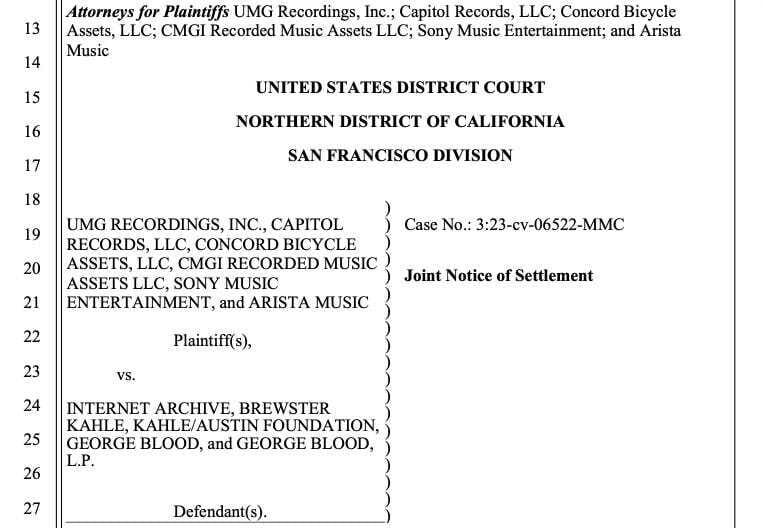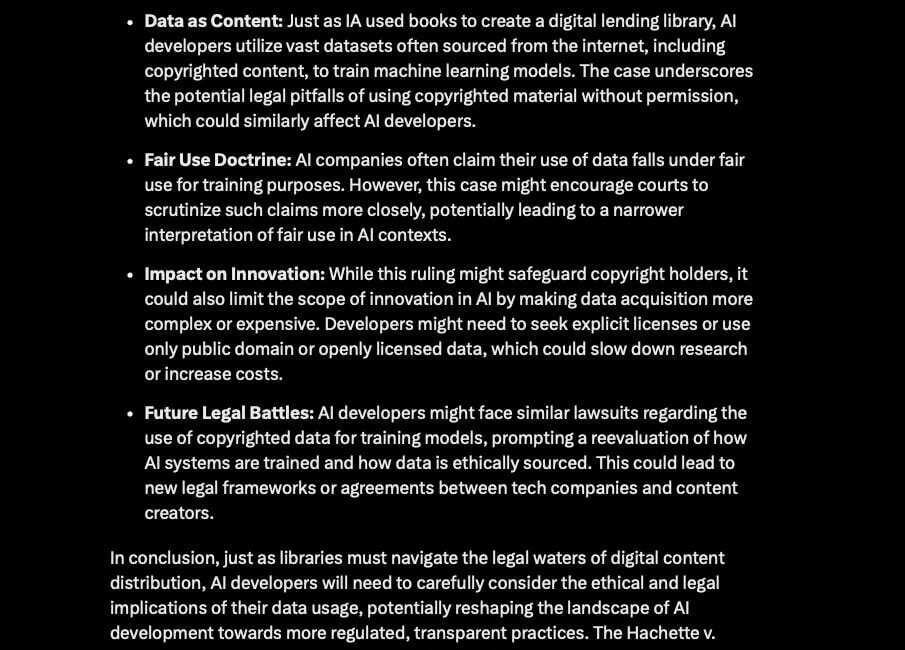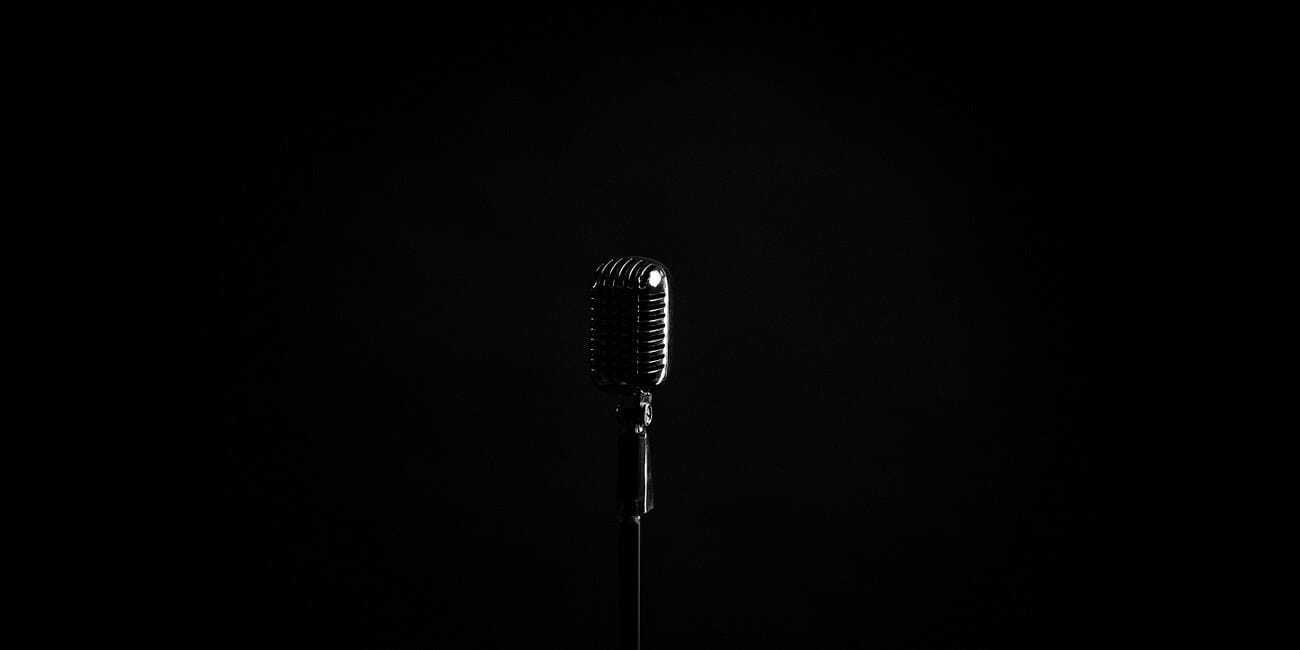- Pascal's Chatbot Q&As
- Posts
- Music Labels v. Internet Archive: Copyright owners can successfully challenge digitization initiatives, even those with cultural or nonprofit goals, when proper licensing is not secured.
Music Labels v. Internet Archive: Copyright owners can successfully challenge digitization initiatives, even those with cultural or nonprofit goals, when proper licensing is not secured.
Nonprofits and digital platforms must assess their copyright exposure before launching digitization or access projects, obtaining explicit licenses or engaging in collective licensing agreements.
Lessons from the Internet Archive and Music Labels Copyright Settlement
by ChatGPT-4o
Introduction: A Clash of Missions
The recently settled legal dispute between the Internet Archive and major music labelsincluding Universal Music Group, Sony Music, and Concord Bicycle highlights a fundamental tension in the digital age: the preservation of cultural heritage versus the protection of intellectual property. At the center of the dispute was the Internet Archive’s “Great 78 Project”, a public initiative aimed at digitizing fragile 78-rpm records to preserve early audio recordings for future generations. The music labels, however, saw the project not as digital preservation but as unauthorized distribution of copyrighted works, including recordings by legendary artists like Frank Sinatra, Miles Davis, and Billie Holiday.
What Was the Case About?
Filed in 2023 in the Northern District of California (Case No. 3:23-cv-06522-MMC), the lawsuit accused the Internet Archive and its partners—including founder Brewster Kahle, the Kahle/Austin Foundation, George Blood, and George Blood LP—of turning the preservation project into an “illegal record store.” Over 4,000 songs were said to be made available for download and streaming without proper licenses, according to the plaintiffs.
The Internet Archive defended its actions by invoking fair use, arguing that its mission aligned more with that of a library preserving public goods rather than a commercial distributor. However, the court previously ruled against similar defenses in other contexts, notably when the Archive lost a separate case over its digital book-lending program.
How the Case Was Settled
On September 15, 2025, the parties jointly notified the court that a settlement had been reached. The exact terms of the agreement remain confidential, and both parties asked the court to pause all upcoming deadlines while they perform specific actions outlined in the settlement. They committed to filing a stipulation of dismissal with prejudice—meaning the case cannot be refiled—within 45 days.
This suggests a comprehensive resolution with likely financial and operational implications for the Internet Archive, although the public may never know the full scope.
Key Lessons for Stakeholders
1. For Content and Rights Owners: Assertive Enforcement Works
The settlement reinforces that copyright owners can successfully challenge digitization initiatives, even those with cultural or nonprofit goals, when proper licensing is not secured. The use of well-known IP litigation firms and the Recording Industry Association of America (RIAA) helped maintain industry solidarity and legal pressure.
Takeaway: Rights owners should actively monitor digital archiving initiatives and ensure that unauthorized use of even obscure or vintage content is addressed.
2. For Platform Operators and Nonprofits: Fair Use Is Not a Blanket Shield
The Internet Archive's repeated reliance on fair use has met increasing resistance in court. In this case, the judge had previously rejected time-barred arguments, keeping the lawsuit alive. Combined with its earlier loss in the book-scanning case, the Archive faces a growing precedent against unlicensed digitization—even when noncommercial.
Takeaway: Nonprofits and digital platforms must carefully assess their copyright exposure before launching digitization or access projects. Obtaining explicit licenses or engaging in collective licensing agreements is becoming essential.
3. For the Courts and Legal System: Expect More Conflicts in the Grey Zones
The case exemplifies the ambiguity in copyright law when it comes to historical works and preservation. While legal clarity is slowly emerging through these cases, it also reveals the urgent need for updated legislation that balances preservation rights with commercial protections.
Takeaway: Courts may continue to play a central role in defining how archival initiatives intersect with IP laws until clearer regulatory frameworks emerge.
4. For Policy Makers and the Public: Consider Cultural Loss in Enforcement
Although the music labels were legally justified, critics argue that public access to rare, fragile, and culturally significant recordings is harmed by over-enforcement. The Great 78 Project was not profiting from these works but sought to protect historical artifactsthat are otherwise deteriorating.
Takeaway: There is a growing call for nuanced copyright exceptions or safe harbor provisions for preservation-based nonprofits. This case might invigorate discussions on reforms.
Conclusion: Balancing Access and Ownership in the Digital Age
The Internet Archive settlement marks another pivotal moment in the ongoing battle between cultural preservationand copyright enforcement. While the music labels prevailed, and rightly so under current law, the case highlights the need for clearer rules, modern licensing structures, and potentially policy carve-outs for archival digitization of endangered media.
In applauding or criticizing the outcome, much depends on perspective. From a rights enforcement standpoint, this was a necessary assertion of legal control over valuable IP. From a public access and preservation angle, it underscores how fragile digital knowledge can be when legal frameworks don’t keep pace with technological and cultural realities.
To prevent similar conflicts in the future, all stakeholders—including platforms, rights holders, and regulators—must work toward sustainable access models that allow for historical preservation without undermining rightful ownership. Only then can society ensure that culture is both protected and shared.

·
6 DECEMBER 2024

Hachette v. Internet Archive: A Landmark Case on Digital Lending
·
12 AUGUST 2023

Question 1 of 6 for ChatGPT-4: Please analyse this legal complaint and draft me a short summary and explain in easy to understand language what the grievances of the music companies are and what the issues described in the Cause of Action 1 to 10 relate to.